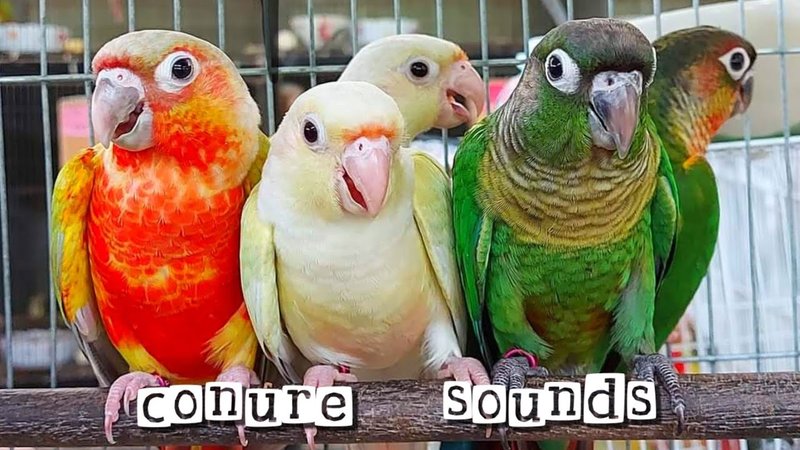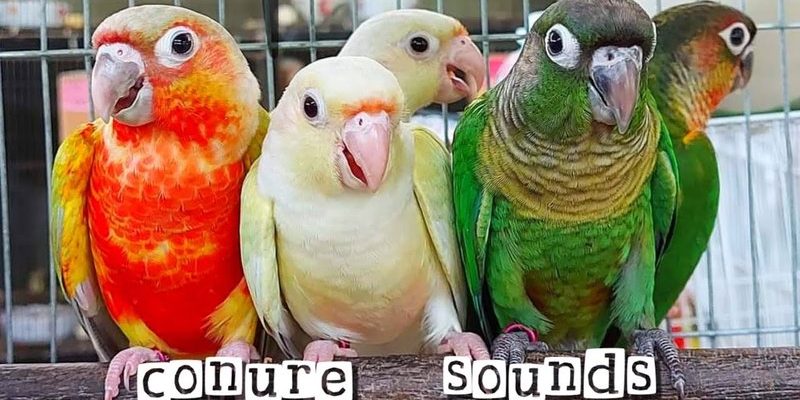
Think of it like a conversation over coffee. You have your points, your stories, and those delightful little quirks that make your chats unique. Your conure does the same! From happy squeals to mournful cries, each vocalization can give you insight into what they’re feeling or what they might need. Understanding these sounds not only deepens your bond with your bird but also helps you meet their needs better.
Let’s dive into the world of conure vocalizations and unravel what these delightful sounds really mean.
The Basics of Conure Vocalizations
Conures are known for their vocal capabilities, much like how some people express themselves through music or art. They can create a variety of sounds, from soft whistles to loud screeches. Each sound can indicate different feelings or states. If you think about it, it’s a bit like how we use tone and volume to convey our own emotions.
For instance, a conure’s cheerful chirp often indicates happiness. When they’re feeling playful, you might hear a series of happy noises. On the flip side, if your feathered friend is making a loud, harsh squawk, they might be signaling distress or discomfort. Just like us, they have different ways of letting us know how they feel!
Conures also communicate in context. Just as you’d raise your voice to get someone’s attention or speak softly when sharing a secret, conures adjust their volume and tone based on their environment and what they want to convey. Once you start paying attention, you’ll begin to notice patterns in their vocalizations.
Common Vocalizations and Their Meanings
Here’s a closer look at some common vocalizations you might hear from your conure and what they typically mean:
- Chirping: This is a common sound among happy conures. Picture them basking in the sunlight, feeling content. Chirps usually mean they’re in a good mood, enjoying their surroundings.
- Squawking: If your conure lets out a loud squawk, it can signal a few things. They might be seeking your attention or expressing frustration. Think of this as their way of saying, “Hey! Look at me!”
- Whistling: A soft whistle can often indicate curiosity or excitement. Maybe they see a new toy or something intriguing outside. It’s their way of saying, “What’s that?”
- Crying: If you hear your conure making a whimper or a sad call, it could be a sign that they feel lonely or anxious. Just like us, they can feel a bit down at times.
Recognizing these sounds can help you respond appropriately. For example, if you notice that your conure is squawking frequently, it might be a good idea to spend some extra time with them or check their environment for things that could be bothering them.
The Role of Environment in Vocalization
Just like a cozy café can spark conversation, the environment can significantly influence how much and what kind of sounds your conure makes. If their surroundings are calm and stimulating, you’ll likely hear more cheerful chirps and playful whistles.
On the other hand, if they’re placed in a loud or chaotic room, they might resort to squawking as a way to compete with the noise. Think about how you’d react in a crowded place; you’d probably have to raise your voice to be heard!
Creating a supportive environment is key. Provide a comfortable space with their favorite toys, perches, and plenty of interaction. When you do this, your conure will feel more secure, and you may notice their vocal behaviors becoming more positive.
Developing a Vocalization Dictionary
If you want to take your conure communication skills to the next level, consider creating a little “vocalization dictionary.” This could be as simple as noting the sounds your conure makes and what you believe they mean based on their context and behavior.
For example, you might jot down that a particular chirp happens when they see a certain toy. This practice not only helps you understand your conure better but also enhances your bond with them. You’ll feel more connected, like you’re speaking the same language!
You might even find that your conure has unique sounds that are specific to them. Get to know those personal quirks! Over time, you’ll have a better understanding of your bird’s moods and needs.
Understanding the Importance of Vocalization
Now, you might be wondering, why is it so important to pay attention to these vocalizations? Understanding your conure’s sounds helps you provide better care and improves your relationship. When you respond thoughtfully to their vocalizations, they feel heard and understood—a little emotional reassurance can go a long way!
Ignoring their calls can lead to stress for your bird, which might lead to behavioral issues. Instead, when you acknowledge their attempts to communicate, you create a more harmonious living environment.
Here’s the thing: Your conure isn’t just making noise for fun. They’re trying to tell you something! Whether they’re hungry, bored, or just want to interact, being tuned into their vocalizations can help you respond appropriately.
Common Misunderstandings About Conure Sounds
Many new conure owners often misunderstand certain vocalizations. For instance, a loud squawk can be perceived as a sign that your conure is angry when, in fact, they might just be trying to communicate something important.
Another common myth is thinking that all vocalizations are negative. Many people fear that when their conure makes noise, it indicates something is wrong. In reality, conures will often vocalize out of pure excitement or playfulness too.
To clear up these misunderstandings, it’s helpful to consider the context. What else is happening around your conure when they make certain sounds? By taking a moment to observe, you’ll quickly learn what is typical for your feathered friend.
Tips for Encouraging Positive Vocalizations
If you want to encourage your conure to vocalize positively, there are several strategies you can try:
- Play with Them: Spend quality time engaging with your conure. Playtime can often inspire happy sounds.
- Provide Toys: Toys that stimulate their natural instincts can lead to delightful noises. Just like children, conures love to explore and play!
- Talk to Them: Engage in conversation with your conure. They often mimic sounds and words, so your interactions can encourage vocalization.
- Positive Reinforcement: When your conure makes happy noises, offer them treats or affection. This rewards their vocal efforts.
Implementing these tips can create an environment where your conure feels encouraged to share their thoughts. Plus, it can be pretty fun to hear all the different sounds they come up with!
In summary, understanding conure vocalizations is not just about decoding sounds; it’s about enhancing your connection with your feathered friend. The more you listen and engage, the deeper your bond becomes. Remember, each chirp and squawk is a window into their world—so tune in, and enjoy the conversation!

